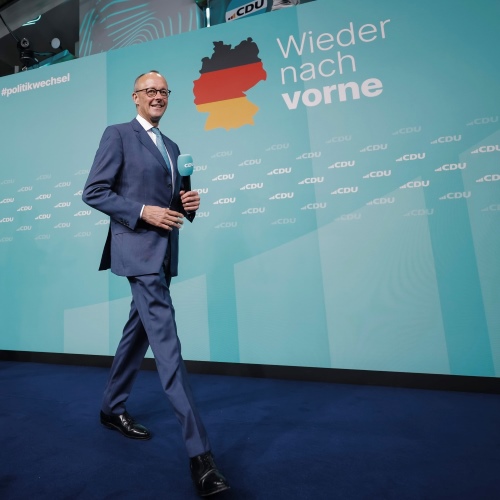Friedrich Merz, the leader of Germany's Christian Democratic Union (CDU), is set to become the next Chancellor of Germany after securing a decisive victory in the 2025 federal elections. His CDU/CSU alliance secured 28.5% of the vote, while the outgoing Chancellor Olaf Scholz's Social Democrats (SPD) received around 16%. The elections also marked the rise of the far-right Alternative for Germany (AfD), which doubled its support, making it the most significant far-right showing since World War II.
Heute Abend im Konrad-Adenauer-Haus: Rambo Zambo🕺💃 pic.twitter.com/A8a38hHkS1
— CDU Deutschlands (@CDU) February 23, 2025
Who is Friedrich Merz ?

Source: X.com/@_FriedrichMerz
A Prominent German Politician and Leader
Joachim-Friedrich Martin Josef Merz, widely known as Friedrich Merz, is a seasoned German politician and lawyer. Born in 1955, he is 69 years old (as of 2025) and has been a key figure in Germany’s political landscape for decades. A member of the Christian Democratic Union (CDU), Merz has served in various influential roles, including as a member of the European Parliament in 1989 and the German Bundestag since 1994. He took over the leadership of the CDU in 2021, shaping the party’s direction with his firm stance on economic liberalization, migration policies, and efforts to cut bureaucratic red tape. Apart from politics, he has also had a notable career in finance, serving as the chairman of BlackRock Germany. Known for his pro-business approach and conservative values, Merz continues to be a significant voice in German and European politics.
| Attribute | Details |
| Full Name | Joachim-Friedrich Martin Josef Merz |
| Age | 69 years (as of 2025) |
| Political Affiliation | Christian Democratic Union (CDU) |
| Career Highlights | - Leader of CDU since 2021 |
Friedrich Merz’s Political Journey
Friedrich Merz started his political career in the European Parliament (1989–1994). He became a Bundestag member in 1994 and served as CDU’s parliamentary leader from 2000 to 2002. After losing internal CDU battles, he left active politics in 2009 to work in finance and law. He returned in 2021 to lead CDU after Angela Merkel’s retirement. Now he will Lead CDU by becoming the next Chancellor of Germany to victory in the 2025 elections.

Source: dw.com/ARD/infratest dimap, Preliminary offical result
Key Policy Positions
Economic Reforms
Friedrich Merz Advocates for simplified tax regulations, famously arguing that tax returns should fit on a beer coaster. He also pledges to tackle bureaucratic red tape that hinders businesses. He supports reducing corporate regulations, especially the complex Supply Chain Due Diligence Act (Lieferkettensorgfaltspflichtengesetz). He has to seek to review Germany's debt brake policy to allow greater public investment.
Immigration & Security
He strongly emphasizes curbing irregular migration and advocates for stricter border control policies. He has also been criticized for indirectly relying on AfD support in a recent parliamentary vote but denies any plans for a coalition with them.
Foreign Relations
- Europe and the U.S.: Prioritize strengthening European unity amidst growing geopolitical tensions.
- U.S. Relations: Initially supported Donald Trump-style business diplomacy but later distanced himself after Trump shifted his stance on Russia’s Ukraine invasion.
- Ukraine Conflict: Advocates for stronger German military aid, including providing Taurus cruise missiles to Kyiv.
- Russia: Opposes any appeasement policies toward Moscow.
Challenges Ahead
| Issue | Challenges & Proposed Solutions |
| Economy | Germany faces recession, high energy costs, and aging infrastructure. Merz aims to revise debt rules and boost investment. |
| U.S. Relations | Uncertain U.S. policies under Trump could strain transatlantic ties. Merz seeks to strengthen EU independence. |
| Migration | Balancing border control with humanitarian responsibilities. |
| Ukraine Conflict | Supporting Kyiv without escalating direct military involvement. |
| Far-Right AfD | Maintaining CDU's anti-AfD stance while navigating fragmented politics. |
Conclusion
Friedrich Merz steps into office at a critical juncture for Germany, with economic concerns, foreign policy dilemmas, and internal political shifts dominating the landscape. While he has positioned himself as a pro-business, conservative leader, his ability to navigate Germany’s fractured political environment and international uncertainties will define his chancellorship. Whether he will succeed in revitalizing Germany’s economy and securing its place in a rapidly changing world remains to be seen.
Comments
All Comments (0)
Join the conversation